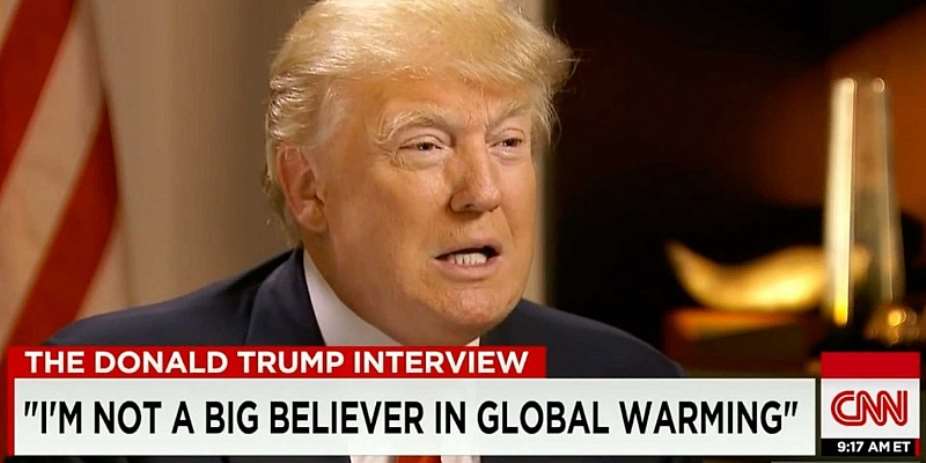Who on earth does not feel the heating impacts of global warming? US president Donald Trump last week appointed Kathleen Hartnett-White, a former chairman of the Texas Commission on Environmental Quality, to head a key White House office that coordinates environmental and energy policies across the government. Perhaps if we knew who Kathleen is, we would know the depth of Trumps climate Cynicism.
President Obama, and yes, he remains President, once said during the COP 21 Paris agreement that Cynicism is one of the greatest betrayal of climate efforts progress. But now with Trump, Obama’s passion cannot hold. He simply sits and watches the nomination of Hartnett-White to chair the administration’s Council on Environmental Quality.
Like many other members of the Trump administration, she has long questioned the overwhelming scientific consensus on human-fueled climate change and has criticized the findings of the Intergovernmental Panel on Climate Change (IPCC), a volunteer group of climate scientists whose findings are considered the gold standard of climate science.
Trump himself might be influenced by gigantic oil and gas lobbies with undying political interests. But appointing Kathleen was like adding fuel to fire.
That’s why, talking to CNN a day after, described efforts to combat global warming as little more than an attack on the fossil fuel industry.
“I am not at all persuaded by the IPCC science that we are standing on some precipice,” Hartnett-White told The Washington Post last October, referring to the urgency to combat global warming. “We’re not standing on a cliff from which we are about to fall off.”
Hartnett-White is a senior fellow at the Texas Public Policy Foundation, an organization whose board of directors includes oil industry executives and GOP activists. Koch Industries, an oil-based conglomerate that has funded a variety of libertarian political groups, was among the group’s broad range of original donors.
The Council on Environmental Quality or CEQ, formed in 1970, doesn’t just coordinate environmental policy at the White House. It plays a central role in the implementation of American Environmental Policy Act, or NEPA, which requires an assessment of the environmental impacts of many proposed federal actions before they are undertaken.
of energy and environmental policy at the Center for American Progress and a former managing director of the White House Council on Environmental Quality, called Hartnett-White’s nomination a win for the industry interests.
“She advocates for the moral case for developing fossil fuels, which flies in the face of the responsibilities of the chair to engage the public on environmental issues and advise the president on how to protect the public from the greatest environmental threats,” Goldfuss said in a statement. “As communities rebuild across the country from climate fueled wildfires and hurricanes, her stated alliance with the fossil fuel industry makes her unfit to hold the highest environmental post in the government to advise the president on the real moral threat to our country: climate change.”
Even with the nomination of Hartnett-White, who must be confirmed by the Senate, the Trump administration has left empty dozens of key scientific posts throughout the government.
The positions span high-level science advisory jobs in the White House, the National Science Foundation and the Department of Energy.
By Boaz Opio






 Lay KPMG audit report on SML-GRA contract before Parliament – Isaac Adongo tells...
Lay KPMG audit report on SML-GRA contract before Parliament – Isaac Adongo tells...
 Supervisor remanded for stabbing businessman with broken bottle and screwdriver
Supervisor remanded for stabbing businessman with broken bottle and screwdriver
 NDC watching EC and NPP closely on Returning Officer recruitment — Omane Boamah
NDC watching EC and NPP closely on Returning Officer recruitment — Omane Boamah
 Your decision to contest for president again is pathetic – Annoh-Dompreh blasts ...
Your decision to contest for president again is pathetic – Annoh-Dompreh blasts ...
 Election 2024: Security agencies ready to keep peace and secure the country — IG...
Election 2024: Security agencies ready to keep peace and secure the country — IG...
 People no longer place value in public basic schools; new uniforms, painting wil...
People no longer place value in public basic schools; new uniforms, painting wil...
 'Comedian' Paul Adom Otchere needs help – Sulemana Braimah
'Comedian' Paul Adom Otchere needs help – Sulemana Braimah
 Ejisu by-election: Only 33% of voters can be swayed by inducement — Global InfoA...
Ejisu by-election: Only 33% of voters can be swayed by inducement — Global InfoA...
 Minority will expose the beneficial owners of SML, recover funds paid to company...
Minority will expose the beneficial owners of SML, recover funds paid to company...
 Prof. Opoku-Agyemang has ‘decapitated’ the NPP’s strategies; don’t take them ser...
Prof. Opoku-Agyemang has ‘decapitated’ the NPP’s strategies; don’t take them ser...
